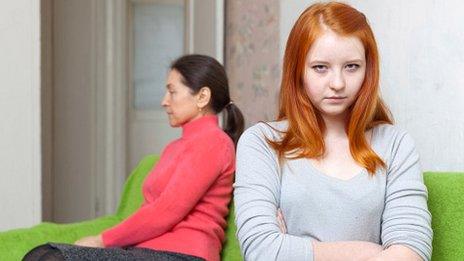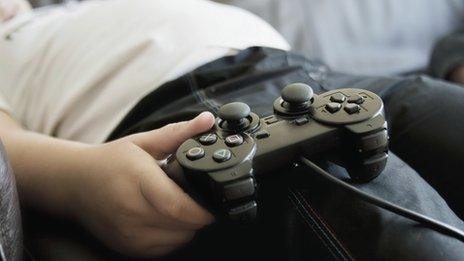Computer time is modern parents' bribe and threat
- Published

Denial of screen time is now the front line of family arguments
Parents are using access to computers as a way of controlling their children's behaviour, according to a study of modern childhood.
The Childwise survey, which has been tracking family life in the UK since the 1990s, shows a surge in the number of tablet computers used by children.
But it suggests that parents use time on tablet computers as a way of rewarding or punishing their children.
The study shows young people spend more time online than watching television.
This latest report from Childwise, the 21st annual survey, shows children's lives suffused with technology, using tablet computers, laptops, videogames and smartphones.
Tablets 'modern treat'
The study, based on a representative sample of more than 2,000 children across the UK, aged 5 to 16, shows that two of the most popular destinations are YouTube and the online game Minecraft.
The use of tablet computers is overtaking laptops among young children, says the survey - and it suggests they have become important bargaining chips in family negotiations.

Mobile phones are teenagers' route to socialising, music and the internet
"Parents like tablets because they are controllable - a tablet can be given or taken away to reflect good or bad behaviour, in a way that is not possible with a conventional television set or computer," says the research.
"Apps can be purchased as rewards, and, with the growing use of tablets in primary schools, there are strong perceived educational advantages."
Research director Simon Leggett says tablet computers are particularly likely to be seen as the young person's personal possession, making the arguments about restrictions even more fraught.
Access to the internet is now so integrated into young people's lives, he says, that they see access as a fundamental right rather than a privilege.
This will strike a chord with many families, suggests Cathy Ranson, editor of the Netmums parenting website.
"Banning screen time is the modern version of "grounding" kids," she said.
She said a study of Netmums users had found many parents using limits on computers as a punishment or reward, replacing "traditional treats".
But she warned that too much emphasis on access to screen time could prioritise computers "to the exclusion of real family life".
Multi-task generation
The Childwise annual survey shows that among the youngest group, five to seven year olds, one in three have their own tablet computer, with two in five going online every day for an average of more than an hour.
Among older children, in the 13 to 16 year old group, internet use is even more widespread, averaging two and a half hours a day, with YouTube the most widely used website.

Children often use mobile phones or computers when watching television
Smartphones are owned by nine of out of 10 of these teenagers, who use them for accessing the internet and using services like Snapchat with their friends.
It is much more likely that teenagers will listen to music using their mobile phones rather than any other way.
They are often using several different technologies at the same time. More than four in five young people watching television are multi-tasking, typically also using the internet or their mobile phones. Only 17% are only watching television.
Computer technology is also influencing reading habits - with Minecraft manuals among the most popular titles.
In terms of health, there is much more screen time than exercise.
Teenagers allocate the biggest amount of their spare time to using the internet, followed by watching television.
They spend on average more time each night online than they spend in the entire week on sports activities outside school.
Among teenagers, Facebook is described as "losing its primacy", with the rise of other social media platforms, such as Snapchat and Instagram, and the growing popularity of video bloggers.
Television still remains an important part of young people's media habits, particularly among teenagers, although increasingly it is not live television, but on-demand services such as iPlayer, or subscription services such as Netflix.
Almost all young people used some form of on-demand services or watch programmes on YouTube. This means that popular programmes do not have to be current.
Among 13 to 14 year olds, Friends was identified as the most popular programme, even though there have been no new episodes for more than a decade.
- Published23 December 2014

- Published3 December 2014
